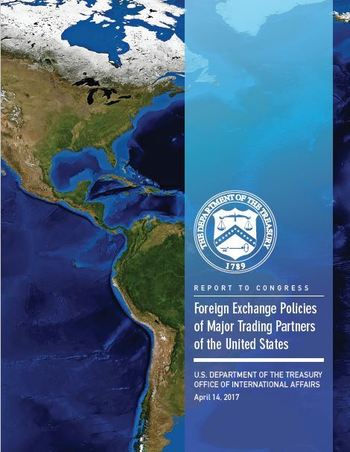Posted on : Apr.1,2018 09:04 KST
 |
|
A US Treasury Department report on the foreign exchange policies of major trading partners of the US.
|
Announcement viewed as a political stunt by Trump administration to play up results of the negotiations
 |
|
A US Treasury Department report on the foreign exchange policies of major trading partners of the US.
|
The South Korean government emphatically stated that exchange rate discussions with the US took place separately from discussions on the two sides’ Free Trade Agreement (FTA) and sent a message to Washington strongly protesting their presentation as having been linked.
“The South Korea-US FTA negotiations and exchange rate discussions were entirely separate,” a senior Ministry of Strategy and Finance (MOSF) official said at a Mar. 29 briefing.
“We sent a strong message of protest over the US government causing unnecessary misunderstandings in announcing the outcome for the KORUS FTA,” the official said.
Previously, the Office of the US Trade Representative issued a press release on the outcome of the KORUS FTA negotiations in which it stated, “An agreement (memorandum of understanding) is being finalized on robust provisions to prohibit competitive devaluation and exchange rate manipulation in order to promote a level playing field for trade and investment.”
A senior MOSF official explained, “Last year, the US government tried to include exchange rate provisions in its NAFTA re-negotiation, and it tried to tie the exchange rate issue in with its re-negotiation of the KORUS FTA early this year.”
“But the South Korean government adamantly refused, saying that was ‘unacceptable,’” the official added. This account would mean subsequent exchange rate discussions were held by MOSF and the US Treasury Department separately from the FTA negotiations.
Seoul also viewed the USTR’s reference to the exchange rate issue in announcing outcomes from the FTA talks as a political gesture meant to play up the results from the talks. Appearing on the live Blue House Facebook broadcast “11:50 at the Blue House” that day, Minister for Trade Kim Hyun-chong asserted, “There was no content whatsoever regarding exchange rates in the announcement jointly made with USTR [Robert] Lighthizer.”
“He appears to have made an announcement tying the exchange rate issue together with the KORUS FTA amendments and steel negotiations to ramp up the dramatic effect ahead of the midterm elections in November,” Kim suggested.
While exchange rate-related provisions have been included in multilateral agreements such as the Trans-Pacific Partnership (TPP), they have not been included in bilateral agreements to date.
At the same time, Seoul is actively weighing going public with its foreign exchange market interventions to avoid US designation as a “currency manipulator.”
“South Korea is the only OECD member that does not disclose its foreign exchange market interventions, so it will need to be considered in a forward-thinking way,” a MOSF senior official said.
By Jung Eun-joo, staff reporter
Please direct questions or comments to [english@hani.co.kr]
Caption: A US Treasury Department report on the foreign exchange policies of major trading partners of the US. (Hankyoreh Archive)










